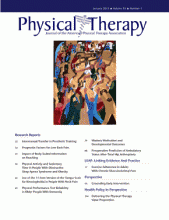Abstract
This perspective article provides support for 4 interrelated tenets: grounded perceptual-motor experience within cultural and social contexts forms cognition; exploration through early behaviors, such as object interaction, sitting, and locomotion, broadly facilitates development; infants and children with limited exploration are at risk for global developmental impairments; and early interventions targeting exploratory behaviors may be feasible and effective at advancing a range of abilities across developmental domains and time. These tenets emphasize that through the promotion of early perceptual-motor behaviors, broader, more global developmental advancements can be facilitated and future delays can be minimized across domains for infants and children with special needs. Researchers, educators, and clinicians should build on these tenets to further demonstrate the effectiveness of targeted early interventions. The goals of these interventions should be not only to advance targeted perceptual-motor skills in the moment but also to more broadly advance future abilities and meet the early intervention goal of maximizing children's learning potential.
Footnotes
Dr Lobo, Dr Harbourne, and Dr Dusing provided concept/idea/project design. All authors provided writing. Dr Lobo provided project management. Dr Dusing provided fund procurement.
The authors acknowledge the following funding sources for bringing them together to form the Early Learning Consortium: American Physical Therapy Association, Section on Pediatrics, Planning Grant 2008 (Does Early Postural Intervention Affect Sitting Balance or Reaching in Infants Born Preterm? Principal Investigator: Susan C. Dusing, PT, PhD, January 1, 2009–July 1, 2011); and NIH/NCMRR/NICHD/NINDS grant 1K12HD055931-01 (Multicenter Career Development Program for Physical and Occupational Therapists and Comprehensive Opportunities in Rehabilitation Research Training Program. Principal Investigator: Michael Mueller, PT, PhD, FAPTA, September 15, 2007–August 31, 2012).
- Received April 2, 2012.
- Accepted September 17, 2012.












